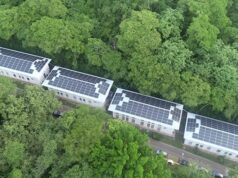
HALLOWELL, MAINE—The Maple Hill Farm Bed and Breakfast, located on 130 acres not far from Maine’s capital building, has earned a reputation as an environmental leader and deservedly so. Even though the property has just eight guestrooms, it is home to Maine’s largest solar array, has its own wind turbine, and was the first property in the state to receive Green Lodging Inn Certification from the Maine Department of Environmental Protection.
Scott Cowger and Vincent Hannan are co-owners of the property and have owned it for 15 years. The investments they have made in the bed and breakfast primarily have to do with saving energy. An efficient oil-fired boiler heats the water used to warm guestrooms during the cooler months. Hot water baseboard heat is used and each room’s temperature can be individually controlled.
Last December, Maple Hill installed a solar electric hot water system on the roof of its 150-seat conference center. Cowger says the system cost $160,000 but a grant from the U.S. Department of Agriculture’s Rural Development Agency covered $41,500 of the costs. Maine’s Public Utilities Commission provided a $35,000 low-interest loan and Maine Energy Investment Corp. which installed equipment to monitor the photovoltaic portion of the solar system, gave Maple Hill $3,000. Solar panels generate up to 15 kilowatts of electricity. Even on cloudy days, the system generates power.

In addition to generating electricity, the solar system also heats water. A total of 202 long tubes carry an antifreeze solution that is heated by the sun. It runs down to the building’s basement where the heat from the solution is exchanged to large water storage tanks. Water temperature can reach up to 160 degrees.
“It is enough to take care of guest showers, our whirlpool tubs, and our kitchen,” Cowger says.
Wind Turbine Generates Power
Working in tandem with the solar electric hot water system to generate power, a wind turbine installed on the property in 2003 cranks out 10 kilowatts of electricity. The payback on that wind turbine will not be as short as the solar system; it will take 30 years to recover the $70,000 investment. Because the inn is not in a high wind zone, the wind turbine has not reached its generating potential.
“It was something we just wanted to do,” Cowger says. “It is a good educational tool and our guests enjoy seeing it.”
On some days, the solar and wind system generate enough electricity for the entire facility. Excess electricity is sold back to the local utility and Maple Hill receives a credit that it can apply to its bill.
The following is a summary of some of the other environmental initiatives at Maple Hill:

• Compact fluorescents are used in all common areas and skylights provide natural light to public spaces as well as the kitchen and laundry area.
• Food waste is fed to the inn’s sheep, goats and chickens. They “go crazy over the scraps,” Cowger says.
• During meetings at Maple Hill’s Gathering Place, real dishes, silverware, linen napkins and tablecloths are used—no plastic or paper goods.
• Citrus-based cleaning products have been implemented.
• In guestroom showers, dispensers replace individual amenity bottles.
• Efforts are made to purchase goods locally and some food items such as eggs are produced on-site.
• Hand dryers in the main restrooms cut down on paper waste.
All of Maple Hill’s efforts are reducing its impact on the environment. The solar electric hot water system is expected to reduce the inn’s annual carbon dioxide emissions by 40,000 pounds. Green initiatives have also been good for business, as an increasing number of guests are drawn to Maple Hill because of its solar and wind projects.
“The eco-savvy traveler is looking for a place like this,” Cowger says.
Go to Maple Hill.
Glenn Hasek can be reached at editor@greenlodgingnews.com.






